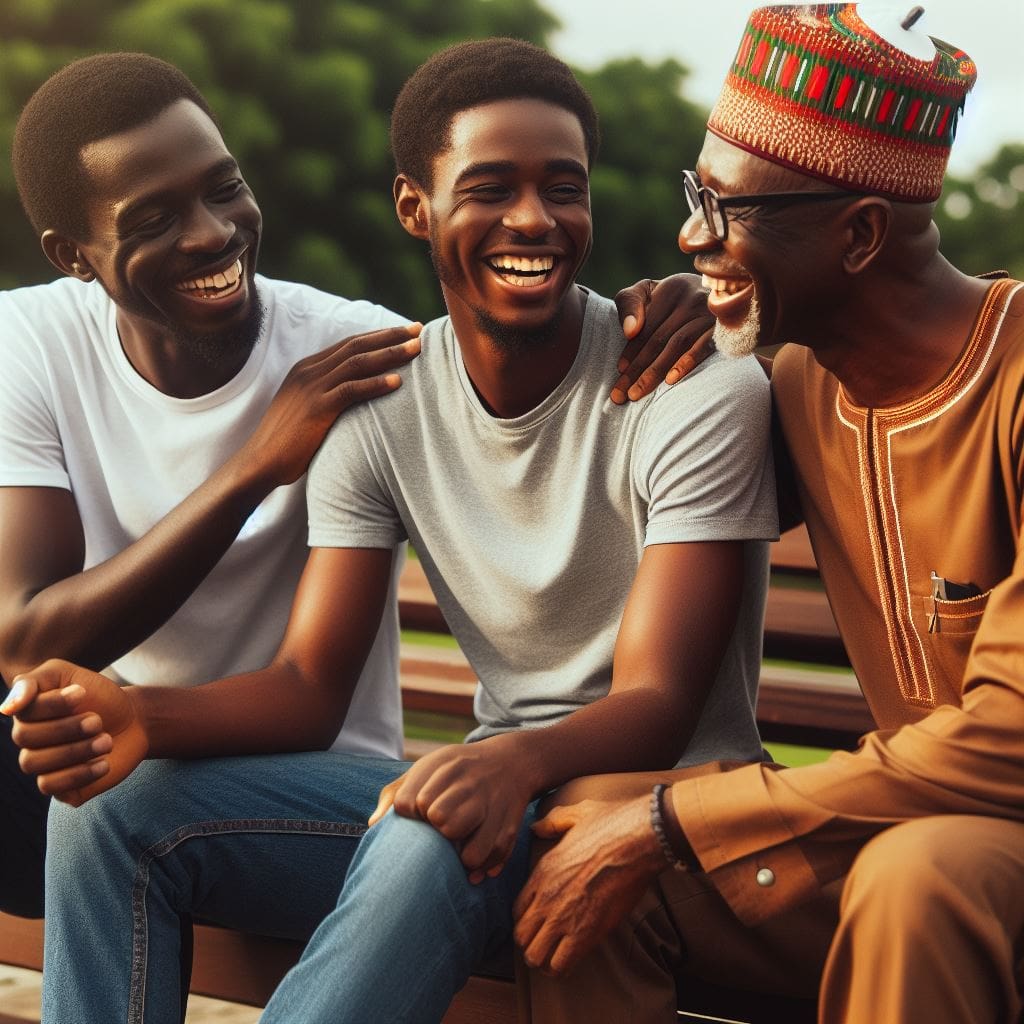What’s going on, my Nigerian brothers! Let’s talk about something important: mental health. We all know the pressure to be strong and tough, the “man up” mentality – but guess what? It’s okay to not be okay sometimes. It is not a sign of weakness.

Here in Nigeria, there might be extra layers to this struggle. Family expectations, societal pressures, and limited resources can make it even harder for men to open up.
But here’s the good news: things are changing! More and more Nigerian men are talking about their mental health, and it’s about time we joined the conversation
This guide is your wingman, helping you navigate the world of men’s mental health in Nigeria. We’ll explore why it can be tough to talk, debunk some myths, and equip you with tips for having open conversations – with yourself and others.
Because remember, bros, strength isn’t about bottling things up. It’s about acknowledging your struggles and reaching out for support.
Let’s break the stigma together and create a space where everyone feels comfortable talking about mental health.
Why Talking About Mental Health Can Be Tough for Nigerian Men
Here are some reasons why Nigerian men might struggle to talk about their feelings:
- The “Man Up” Mentality: Just like everywhere else, there’s pressure to be strong and emotionless. Showing vulnerability can be seen as weakness.
- Cultural Expectations: Family honor and taking care of others might make it feel selfish to prioritize your own mental well-being.
- Limited Resources: Access to mental health professionals can be a challenge in some parts of Nigeria.
- Spiritual Beliefs: Traditional beliefs about mental health might sometimes discourage seeking professional help.
Breaking the Myths: Why Nigerian Men Need to Talk About Mental Health
Here are some common myths debunked:
- Myth #1: Mental health issues only affect the weak. Not true! Many successful Nigerian men experience anxiety, depression, and other conditions.
- Myth #2: Talking to a therapist is “acting white.” Therapy is for everyone! Nigerian therapists understand the unique challenges faced by men in our society.
- Myth #3: Talking about your problems makes them worse. Bottling things up can actually worsen symptoms. Talking about your struggles can be a huge weight off your shoulders.
The Impact of Silence: Why Open Conversations Matter
The consequences of not talking about mental health can be serious. Suicide rates among young men are a growing concern in Nigeria.
Social isolation, substance abuse, and relationship problems can also stem from unaddressed mental health issues.
Open conversations about mental health create a ripple effect. By talking about our struggles, we show it’s okay to seek help and encourage others to do the same.
This can lead to earlier diagnosis, treatment, and ultimately, a stronger, healthier Nigerian community.
Starting the Conversation: Tips for Nigerian Men
Ready to open up, but not sure where to start? Here are some tips:
- Find a Vertraute: Talk to someone you trust, like a close friend, family member who understands Nigerian culture, or a therapist specializing in men’s mental health.
- Start Small: Don’t have to spill everything at once. Start by sharing a general feeling or a specific challenge you’re facing. “I’ve been feeling overwhelmed lately” or “Work has been wahala” can be good starting points.
- Focus on How You Feel: Instead of just describing events, talk about the emotions those events evoke. Saying “I feel stressed” or “This situation makes me feel on edge” can be powerful.
- Active Listening: If someone opens up to you, listen attentively, offer support and encouragement. Sometimes just being there to listen is the best help you can provide.

Resources for Men’s Mental Health in Nigeria
Here are some resources, although finding a therapist might require some additional legwork:
- The Nigerian Institute of Mental Health: This government agency works to improve mental health services in Nigeria. While they might not offer direct services, they can be a good starting point for finding resources.
- The Association of Nigerian Psychiatrists: This professional organization can help you locate a psychiatrist in your area.
While finding a therapist might require some additional effort, here are some resources to get you started:
- Online Resources: There are some international online therapy platforms that might have therapists with experience in African contexts. It’s important to do your research and ensure they are legitimate and qualified professionals.
- Support Groups: Look for online or in-person men’s support groups specifically for Nigerians. Sharing your struggles with others who understand the cultural context can be very helpful. Social media groups can be a starting point for finding such communities.
- Talk to a Religious Leader: Many religious leaders in Nigeria offer pastoral counseling and can be a source of support and guidance.
Remember: It might take some effort to find a therapist in Nigeria, but it’s worth the effort. Don’t be discouraged if the first option you try doesn’t work out – keep searching until you find someone you feel comfortable with.
Taking Care of Yourself: Building Mental Wellness for Nigerian Men
Here are some additional tips for taking care of your mental health:
- Prioritize Self-Care: Make time for activities you enjoy, even if it’s just relaxing with friends over a game of cards or listening to high life music. Taking care of your physical health also contributes to your mental well-being, so eat healthy meals, get enough sleep, and avoid excessive alcohol or drug use.
- Connect with Others: Having strong social connections is crucial. Spend time with family and friends, reach out to old buddies, or join a social club.
- Challenge Negative Thoughts: We all have negative self-talk sometimes, but it’s important to challenge those thoughts. When a negative thought pops up, ask yourself if it’s realistic and try to replace it with something more positive.
- Practice Mindfulness: Techniques like meditation and deep breathing can help you become more aware of your thoughts and feelings without judgment. Mindfulness can help reduce stress and improve overall well-being.
- Take Advantage of Cultural Practices: Explore traditional Nigerian practices that promote mental well-being, such as spending time in nature or participating in community activities.
Remember, You’re Not Alone, Brother
Dear men in Nigeria, it’s completely fine to not feel okay sometimes. We all face difficulties, and it’s alright to ask for help when we need it. In fact, talking about your mental health is a sign of courage, not weakness.
By initiating conversations and removing the negative stereotypes around mental health, we can make Nigeria a place where everybody feels comfortable to speak up about their mental health and get the support they need.
Let’s redefine what it means to be strong. Let’s be strong enough to be vulnerable, strong enough to ask for help, and strong enough to support each other.
Together, we can make mental health a conversation, not a taboo, in Nigeria.
Parting Words
This guide is just a starting point on men’s mental health in Nigeria. However, it’s just the tip of the iceberg, and there’s a lot more to learn.
The purpose of this guide is to encourage you to take the first step towards understanding men’s mental health in Nigeria and seek help if you need it.
Remember, you don’t have to go through this alone; there are resources available to support you. Let’s continue the conversation, support each other, and work together to eliminate the stigma around men’s mental health in Nigeria.



